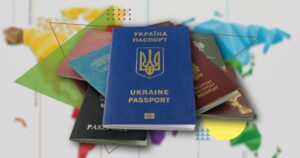
The OLX platform calls for a review of the provisions of Bill No. 14025 on the introduction of international automatic exchange of information on income received through digital platforms, and to take as an example the implementation of such rules in European Union countries.
“According to the proposed regulations, even those who sell only one book or jacket per year will be forced to pay tax or go through a complicated procedure to get a refund through the tax service. The new rules significantly complicate simple and secure online trading. Most individuals who sell goods on our platform are simply getting rid of things they no longer use,” the platform said in a statement.
OLX criticized the government’s proposal to require all private sellers to provide personal data to platforms, regardless of sales volume, as well as the need to pay a 5% personal income tax along with a 5% military levy, and the need to manually refund the tax through the tax service if the annual sales volume does not exceed EUR2,000. The company noted that the introduction of the rules would lead to higher prices for buyers and an increase in “shadow” sales outside digital platforms.
The company noted that it fully supports the objectives of the European DAC7 Directive and emphasized the importance of ensuring tax transparency. OLX insists on the implementation of the requirements of this directive, as has already been successfully done in EU countries.
“In these (European – IF-U) countries, private sellers are not subject to the rules if their annual sales do not exceed €2,000. However, entrepreneurs who trade through online platforms are identified, and their data is responsibly transferred to the tax authorities,” the platform explained.
OLX called on lawmakers to engage in a real dialogue with the market regarding the provisions of the bill. The platform, in turn, is ready to provide expert recommendations on the best international practices for implementing the DAC7 directive, the statement said.
As reported, according to the government bill, a personal income tax (PIT) rate of up to 5% will apply to accountable sellers, provided that they open a separate bank account for receipts from platforms and do not trade in excisable goods, as well as if they are not self-employed, do not have employees, and their annual income does not exceed 834 minimum wages (approximately UAH 6.7 million as of January 1, 2025). For anyone who does not meet these conditions, the general PIT rate remains at 18%.
The government’s submission of a bill to introduce the automatic exchange of information on income received through digital platforms such as OLX, Prom, Rozetka, Uklon, Bolt, etc. is a condition of the cooperation program with the International Monetary Fund. The government approved the relevant document in April and submitted it to parliament, but it was criticized for lacking a minimum threshold for application.

The draft law “On the Use of Assisted Reproductive Technologies” (No. 13638) could radically change the provision of medical services in the field of reproductive technologies and lead to Ukraine losing its status as the “reproductive hub of Europe.” It requires significant revision with the involvement of the professional expert community, according to experts surveyed by Interfax-Ukraine.
“According to various estimates, up to 40-60% of patients in large reproductive medicine clinics are foreigners (especially from the EU, the UK, the US, Canada, Israel, and China). If the law does not provide for transparent mechanisms for foreign patients, such as official medical visas or agreements between countries, Ukraine may lose its status as the “reproductive hub of Europe,” said Dmytro Biletsky, head of the assisted reproductive technology department at the Adonis Medical Gynecological Center (MGK) Adonis Medical Gynecological Center (MGK).
According to him, Ukraine is currently among the top 10 global destinations for reproductive technologies, thanks in particular to “affordable prices: an IVF cycle in Ukraine costs three to five times less than in most EU countries or the US,” the high level of specialists and technologies, the certification of many clinics according to international standards, and the fact that “Ukrainian legislation allows virtually all ART methods — donor eggs, sperm, embryos, IVF programs for married couples and single women.”
“In Ukraine, anonymous donation and the creation of embryos for storage are permitted, which is not acceptable everywhere,” he said.
Predicting the impact of the bill if it is passed, Biletsky expects that in the short term (one to two years), Ukraine may lose some of its patients for reproductive technology (ART) programs, although overall demand will remain high because IVF, donation, and embryo banking procedures will remain permitted, and Ukrainian clinics have an internationally recognized reputation and competitive prices.
However, he predicts that in the medium term (three to five years), “if the rules for foreigners remain strict (especially regarding embryo transportation, donation, and surrogacy), demand will decrease by 20-40%.”
At the same time, commenting on the impact of the bill’s proposed ban on embryo donation on the development of reproductive prospects in general, Biletsky noted that “the ban on embryo donation will result in some patients simply losing the opportunity to treat infertility, as well as an increase in the number of ‘unused’ embryos in clinics.”
“Currently, some couples voluntarily give their frozen embryos to others. If this is banned, embryos will either have to be stored (which is expensive) or destroyed. This raises the ethical question: ‘What to do with embryos that could give life?’” he said.
According to his estimates, donor embryo programs may account for up to 10-15% of all IVF procedures, so clinics specializing in “full cycles” (creation, donation, surrogacy) will lose a significant share of their clients.
“Many foreign patients came specifically for donor embryo programs — this was a unique Ukrainian advantage, because in many countries (for example, Germany and Italy) this is prohibited. The ban will mean the loss of one of the key areas of reproductive medicine. Ukraine is effectively losing one of the most humane mechanisms for helping infertile couples,“ he said.
For her part, Svitlana Shiyanova, head of assisted reproductive technologies at the Dobrobut medical network, also predicts that ”the adoption of this bill will lead to a sharp decline in international demand, as it contains two critical restrictive provisions: a ban on surrogacy services if one of the spouses is a citizen of a country where this method is prohibited, and a requirement that one of the spouses be a citizen of Ukraine (for surrogacy).”
“These provisions effectively close the international surrogacy market, which has brought significant investment to the medical sector. A sharp drop in international demand is expected,” she said.
In addition, Shiyanova noted that the ban on embryo donation provided for in the bill “is one of the most restrictive and controversial provisions of the bill,” which, also contradicts the principles of evidence-based medicine (European Society of Human Reproduction and Embryology, ESHRE) and takes away the last chance for the most vulnerable category of patients, forcing them to seek this service abroad.
“For clinics, this means excluding an important service from the list, which limits the ability to provide a full range of ART and comprehensive patient care,” she said.
According to Shiyanova, the following aspects of reproductive medicine currently require regulatory regulation: the definition of infertility, the determination of who is eligible for ART, the need to ensure the anonymity of donations, the regulation of compensation, as well as the lack of a clear mechanism for creating a single national ART registry and standardized performance monitoring.
As reported, representatives of the Ukrainian Association of Reproductive Medicine (UARM) believe that government bill No. 13683 “On the Use of Assisted Reproductive Technologies” will limit Ukrainians’ access to such technologies.
Tags: Government bill on reproductive technologies may lead to Ukraine losing its status as “Europe’s reproductive hub” – experts
The draft law “On the Use of Assisted Reproductive Technologies” (No. 13638) could radically change the provision of medical services in reproductive technologies and lead to Ukraine losing its status as the “reproductive hub of Europe,” It requires significant revision with the involvement of the professional expert community, according to experts surveyed by Interfax-Ukraine.
“According to various estimates, up to 40-60% of patients in large reproductive medicine clinics are foreigners (especially from the EU, the UK, the US, Canada, Israel, and China). If the law does not provide for transparent mechanisms for foreign patients, such as official medical visas or agreements between countries, Ukraine may lose its status as the “reproductive hub of Europe,” said Dmytro Biletsky, head of the assisted reproductive technology department at the Adonis Medical Gynecological Center (MGK) Adonis Medical Gynecological Center (MGK).
According to him, Ukraine is currently among the top 10 global destinations for reproductive technologies, thanks in particular to “affordable prices: an IVF cycle in Ukraine costs three to five times less than in most EU countries or the US,” the high level of specialists and technologies, the certification of many clinics according to international standards, and the fact that “Ukrainian legislation allows virtually all ART methods — donor eggs, sperm, embryos, IVF programs for married couples and single women.”
“In Ukraine, anonymous donation and the creation of embryos for storage are permitted, which is not acceptable everywhere,” he said.
Predicting the impact of the bill if it is passed, Biletsky expects that in the short term (one to two years), Ukraine may lose some of its patients for reproductive technology (ART) programs, although overall demand will remain high because IVF, donation, and embryo banking procedures will remain permitted, and Ukrainian clinics have an internationally recognized reputation and competitive prices.
However, he predicts that in the medium term (three to five years), “if the rules for foreigners remain strict (especially regarding embryo transport, donation, and surrogacy), demand will decrease by 20-40%.”
At the same time, commenting on the impact of the bill’s proposed ban on embryo donation on the development of reproductive prospects in general, Biletsky noted that “the ban on embryo donation will result in some patients simply losing the opportunity to treat infertility, as well as an increase in the number of ‘unused’ embryos in clinics.”
“Currently, some couples voluntarily give their frozen embryos to others. If this is banned, embryos will have to be either stored (which is expensive) or destroyed. This raises the ethical question: ‘What to do with embryos that could give life?’” he said.
According to his estimates, donor embryo programs may account for up to 10-15% of all IVF procedures, so clinics specializing in “full cycles” (creation, donation, surrogacy) will lose a significant share of their clients.
“Many foreign patients came specifically for donor embryo programs — this was a unique Ukrainian advantage, because in many countries (for example, Germany and Italy) this is prohibited. The ban will mean the loss of one of the key areas of reproductive medicine. Ukraine is effectively losing one of the most humane mechanisms for helping infertile couples,“ he said.
For her part, Svitlana Shiyanova, head of assisted reproductive technologies at the Dobrobut medical network, also predicts that ”the adoption of this bill will lead to a sharp decline in international demand, as it contains two critical restrictive provisions: a ban on surrogacy services if one of the spouses is a citizen of a country where this method is prohibited, and a requirement that one of the spouses be a citizen of Ukraine (for surrogacy).”
“These provisions effectively close the international surrogacy market, which has brought significant investment to the medical sector. A sharp drop in international demand is expected,” she said.
In addition, Shiyanova noted that the ban on embryo donation provided for in the draft law “is one of the most restrictive and controversial provisions of the draft law,” which, also contradicts the principles of evidence-based medicine (European Society of Human Reproduction and Embryology, ESHRE) and takes away the last chance for the most vulnerable category of patients, forcing them to seek this service abroad.
“For clinics, this means excluding an important service from the list, which limits the ability to provide a full range of ART and comprehensive patient care,” she said.
According to Shiyanova, the following aspects of reproductive medicine currently require regulatory regulation: the definition of infertility, the determination of who is eligible for ART, the need to ensure the anonymity of donations, the regulation of compensation, as well as the lack of a clear mechanism for creating a single national ART registry and standardized performance monitoring.
As reported, representatives of the Ukrainian Association of Reproductive Medicine (UARM) believe that government bill No. 13683 “On the Use of Assisted Reproductive Technologies” will limit Ukrainians’ access to such technologies.
ADONIS, Biletsky, BILL, reproductive, Shiyanov, TECHNOLOGIES

Deputy Prime Minister for European and Euro-Atlantic Integration of Ukraine Taras Kachka has met with civil society experts for the second time in a week to discuss preserving the full functionality of the law-enforcement and anti-corruption systems.
According to the Office of the Deputy Prime Minister, the key issue on the agenda is the discussion of the draft law No. 13533 on amendments to the Criminal Procedure Code of Ukraine and some legislative acts of Ukraine on strengthening the powers of the National Anti-Corruption Bureau of Ukraine (NABU) and the Specialized Anti-Corruption Prosecutor’s Office (SAP) submitted by the President of Ukraine Volodymyr Zelensky to the Verkhovna Rada.
“Thank you for your willingness to open dialog and cooperation. Thanks, in particular, to your expertise and preliminary consultations it was possible as quickly as possible to work out a draft of legislative changes aimed at responding to the challenges and ensure the institutional independence of the anti-corruption system,” – quotes Kachka press service.
He emphasized that such interaction between the public sector and civil society is already becoming systemic, and noted that further regular coordination with representatives of civil society is planned.
It is noted that during the meeting the parties also discussed the issues of realization of transformations provided for by the Roadmap in the field of the rule of law – in particular related to the further functioning of law enforcement agencies.
As reported, on July 24, President Volodymyr Zelensky introduced a bill to the Verkhovna Rada regarding the powers of NABU and SAP.
BILL, NABU, САП, Тарас Качка

Ukrainian President Volodymyr Zelensky noted the importance of productive meetings of the Verkhovna Rada next week in his evening address on Saturday.
“A law on multiple citizenship has already been passed, and this is an important issue, particularly for those who are fighting for Ukraine. I am eagerly awaiting the unblocking of this law so that it can be signed without delay,” the head of state said.
He also said that two significant decisions on international agreements had been prepared: “First of all, the agreement on the establishment of a Special Tribunal for the Crime of Russian Aggression must be ratified, and it is also worth supporting our country’s withdrawal from the Ottawa Convention on Landmines. Russia has never been a party to this convention and actively uses all types of mines. We in Ukraine need parity in defense — in particular, the political and legal foundations for such parity,” Zelensky explained.
In addition, “a bill on a military ombudsman has already been prepared for its second reading, and this new systemic step is necessary to implement the necessary changes in the army. I will be grateful to the people’s deputies who support these and other decisions that are extremely important for our state this week,” Zelensky added.

The Verkhovna Rada has passed a bill on multiple citizenship in the first reading, MP Yaroslav Zheleznyak said.
“The Rada supported as a basis the law No. 11469 on the introduction of multiple citizenship in Ukraine,” Zheleznyak wrote in Telegram.
According to him, the bill was supported by 247 MPs at the plenary session of the Verkhovna Rada on Tuesday.